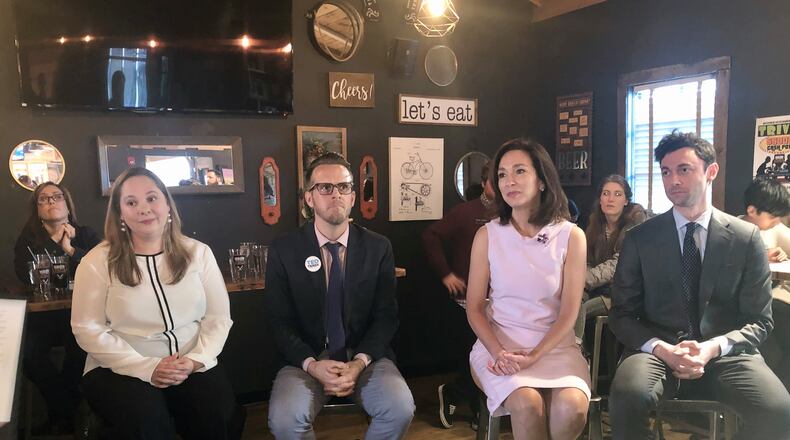Almost as soon as he took the microphone at a Senate Democratic forum, Clarkston Mayor Ted Terry pointed to a GOP tracker recording the event. Then, he asked the audience to send a message to U.S. Sen. David Perdue.
“Hold a town hall,” he bellowed at a crowd crammed into a Dunwoody restaurant on Sunday.
Over the course of the next hour, Terry and the three other Democrats competing to challenge Perdue in November blasted the first-term Republican as a corrupt, complicit and complacent lawmaker tied at the hip with President Donald Trump.
Former Columbus Mayor Teresa Tomlinson called Perdue a disgrace and said she would “destroy the Republican rural strategy.” Jon Ossoff, the former 6th District candidate, said the Republican was a “do nothing” senator.
And Sarah Riggs Amico, who ran for lieutenant governor in 2018, said Perdue is an embarrassment to the office.
“David Perdue has left us a very low bar there. First and foremost, you do the damn job,” said Amico, answering a question about how to restore checks and balances.
“The Senate was supposed to be the grownups in the room. Instead, under the leadership of Mitch McConnell, it’s become a political mud fight.”
What they didn’t do is attack each other, instead aiming their fire at Perdue, a former Fortune 500 chief executive who is one of Trump’s top allies. While unsurprising, that will change as the May primary nears, voters tune in to the contest and contenders start to distinguish themselves.
The race remains unsettled, though Ossoff has emerged as the most formidable fundraiser. He's amassed roughly $2 million since entering the race in September. None of the other candidates have disclosed their latest reports, a sign they have little to brag about.
Still, while the contest for Georgia's other Senate race has captured more recent attention, the clash over Perdue's seat has started to gel.
Fresh off a swing through coastal Georgia, Amico recently stepped down from her family's car-hauling company to run full-time. Tomlinson has overhauled her message after several of her top staffers departed.
Terry is relying on a shoestring budget and grassroots support to drum up support from the liberal base. And Ossoff is trying to leverage his fundraising advantage, volunteer network and name recognition from his 2017 special election bid to establish himself as the front-runner.
Though each of the candidates have staked similar positions on many of the sharpest debates, their remarks offered glimpses of their different approaches.
Eager to capture labor support, Amico pressed the need to raise teacher pay – and protect their right to organize into unions. Asked his healthcare policy, Terry responded "Medicare for All" – then repeated himself twice, to a burst of applause from some in the crowd.
Tomlinson emphasized her two terms as Columbus mayor and called herself an expert in bringing “function to dysfunctional systems.”
And Ossoff said, for the first time, that he would seek an investigation and criminal prosecution of Georgia officials who erased election data or destroyed evidence. It's a reference to a recent claim by a cybersecurity analyst who said a state election server could have potentially been hacked in 2014.
The sharpest contrasts, though, unfolded when they each detailed their strategies to win in November.
Saying Democrats needed to be more “coldblooded,” Terry said the path to victory runs through running up the score in the 6th and 7th Districts – two suburban territories that have become the most intense battlegrounds in the state.
Amico, too, said Democrats needed to drive up the margins in the suburbs while undercutting GOP gains in solidly-conservative counties, saying she’d use the same playbook she employed running on the same ballot as Stacey Abrams in 2018.
And Tomlinson said she would appeal to voters in the suburbs while focusing on the majority-minority counties in middle Georgia that Democrats have long struggled to capture.
“We lost seven that we won in 2014,” she said. “The people in Columbus know the mayor of Columbus is not a socialist. I’m a proud progressive and I’ll go into the 100 counties of central and south Georgia and shave his margins.”
As for Ossoff, he said he’d rely on an extensive volunteer network tasked with door-to-door canvassing and “taking no voter for granted” with an ambitious goal in mind.
“It’s not enough to beat Donald Trump,” said Ossoff. “We need to send a message that if you indulge in this type of politics, you’re not just going to get beaten. You’re going to get beaten so bad, you can never run or show your face again in public.”
About the Author
The Latest
Featured






